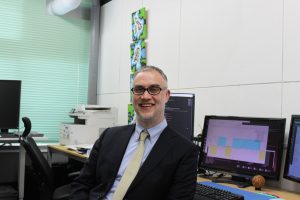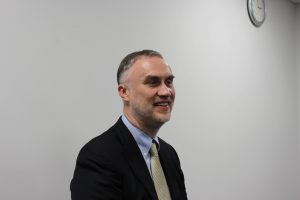

Prof. BOWEN, Mark
The Major in Mathematical Sciences provides a broad curriculum, ranging from fundamental to applied mathematics. The aim is to equip students with knowledge not only of mathematics, but also its connections to scientific and engineering fields, and to provide students with the mathematical skills needed to make a contribution to society.
Our students come from many different cultural and educational backgrounds leading to a vibrant learning community. In addition, we aim for small class sizes for specialised subjects so that students can interact more freely with each other and the course lecturers. We believe that this substantially aids in the study of advanced mathematical topics.
First year: students take courses in the fundamentals of science and engineering, including mathematics, natural sciences, and information science. They also take language courses and courses in the liberal arts.
From the second year onward: students take additional courses focussed specifically on mathematics. Initially, students take foundational courses in pure mathematics (such as algebra, geometry, and analysis) as well as foundational courses in applied mathematics (such as statistics and numerical analysis).
From the third year onward: students select courses in the major according to their own interests. They choose from the broad themes of nonlinear analysis, computational mathematics, and statistical mathematics, or from algebra and geometry.
Fourth year: students are assigned to a laboratory and are required to undertake a final project under the guidance of their research supervisor.
Our educational system is designed to instill logical and mathematical-thinking ability in students in order to foster future scientists and engineers equipped with international communication skills.
We look for applicants that have strong mathematical skills and are self-motivated learners with a deep interest in the study and applications of mathematics. Applicants should also be good communicators capable of clearly thinking through the construction of a logical mathematical argument.
Mathematical modelling is the process of constructing a set of equations that describe the behaviour of some observed phenomena arising from investigations of the natural world, in scientific and engineering disciplines, or in medical and societal contexts.
Differential equations arise when the model describes how some quantities vary in relation to changes in other variables — example variables include time, space, energy, temperature, population density (people, animals, tumour growth, bacteria,. . . ), electronic circuits (current, voltage), mechanical systems (oscillations, damping), fluid flow (density, velocity), chemical processes (reaction, diffusion) and so on.
I focus on the solution of nonlinear (the world is a nonlinear place!) differential equations arising from problems in fluid mechanics. I am particularly interested in understanding the dynamics of thin-film flows, being where a thin layer of liquid coats a surface; such flows have a wide range of functions including industrial coating processes, biological applications, microfluidics, ink-jet printing and semiconductor manufacture.
Although the investigation of such problems is important because of the ubiquity of applications, my interest in this area is primarily driven by the challenging mathematical problems that arise through modelling. Progress in understanding the behaviour of such systems is made through a combination of analysis and computation.
Furthermore, phenomena from a range of other contexts are found to yield similar mathematical problems. This is a common theme in mathematical research – understanding the behaviour of one system often provides valuable insight that can be applied to understanding the behaviour of a variety of other problems.
From my perspective, one of the of the great strengths of the Major in Mathematical Sciences is that undergraduate students in their fourth year have the opportunity to enter a professor’s laboratory and work in a research environment. In this way students experience the same difficulties encountered by professional research scientists when tackling advanced mathematical problems. Such experiences can be challenging, but also a lot of fun as you are effectively in control of your own learning.

When studying mathematics, there is often a strong emphasis placed on arriving at the correct answer for each problem. I would suggest that students focus more on the “story” — the argument that they are developing towards finding the solution — rather than just fixating on obtaining the answer. In this way, you can build a deeper comprehension of the mathematics: understanding why a particular method proves effective, recognising its limitations and discerning its applicability to similar problems.
Drawing a parallel with Sir Arthur Conan Doyle’s stories of Sherlock Holmes, it is Holmes’ methods which are most important, the actual apprehension of the villain being a secondary matter. Even if the mathematical “villain” eludes your capture, you can still learn a great deal from how far you progressed: reflecting on why a certain method failed and evaluating on how close you were to a solution, thereby considering potential adjustments for future attempts.
Finally, I would like to re-emphasise the broad applicability of mathematics in describing phenomena throughout the natural world, in scientific and engineering disciplines, and in medical and societal contexts. Rather than being an “isolated” subject, mathematics pervades our everyday life.
If you want to develop your mathematical skills in an international environment and make a substantial impact in future society, then the Major in Mathematical Sciences at Waseda University is the course for you. The Major in Mathematical Sciences is the door to the future!